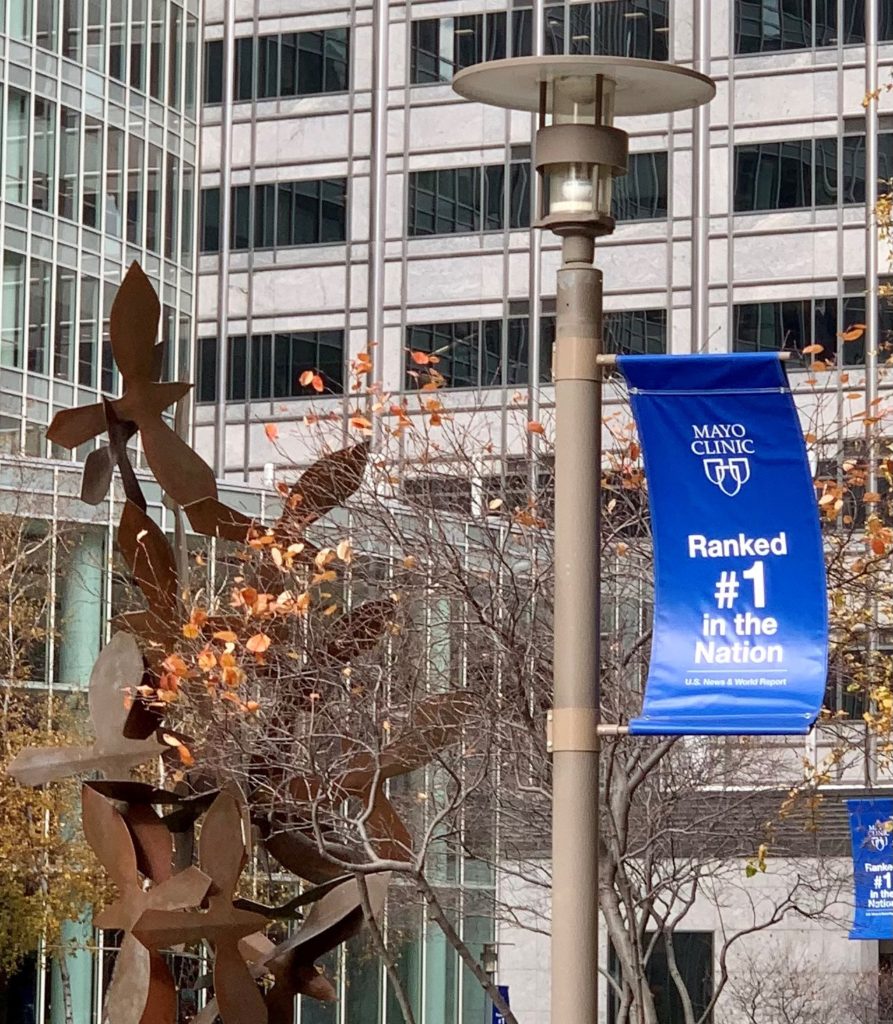
Travelers
The atrium, with its tall ceiling and a vast amount of glass, allows light to come in from several directions as a middle-aged woman sits at a shiny black grand piano and plays an airy tune. Dressed in hospital scrubs, she has just finished her twelve-hour shift as a nurse. I’m told that she and a few other staff members are known to conclude many of their shifts in this way.
She plays a Mozart piece, one that my daughter sometimes plays at home, while scores of people pass by. Some use canes or walkers. Others roll by in wheelchairs. Others wear prosthetic devices on their legs, feet, arms, or hands. Just down the hallway from the piano, one sees the store where wigs, breast prostheses, and compression clothing are available for purchase.
I look over at Vanessa, my talented filmmaker friend, who scans the room with pursed lips. We stand on hallowed ground and watch sacred acts unfold.
We are in Rochester, Minnesota, at the renowned Mayo Clinic. People come here from all over the country and the world because they are sick and have a need for healing, and often they arrive after unsuccessful stopovers in other hospitals and treatment centers. It’s a destination, a site for medical pilgrims, including patients and providers, and a place where people’s deepest hopes are realized and can also remain unfulfilled.
Healers
We have come here to interview Dr. Rodolfo Savica, a neurologist and movement disorder specialist whose focus is on young-onset Parkinson’s disease. He has unconventional takes on this illness with which I and many others live, even viewing it as a different disease than typical, later-onset Parkinson’s. He’ll be featured in a documentary film that Vanessa and I are making.
One needs only a few moments in his presence to discover that his knowledge and wisdom as a researcher are matched by his passion for clinical work and by a tireless effort to help his patients feel better and live better with this illness.
He came to Mayo more than a decade ago from Italy, his sole purpose being to hone his calling as a healer, to do his life’s work. “I fell in love with the basal ganglia,” he says, “and I deeply value the teamwork approach at Mayo. All of us work together to support patients…to support one another.” As Tolstoy noted of those in the healing arts, “They satisf[y] that eternal human need for hope of relief, for sympathy, and that something should be done, which is felt by those who are suffering.”[1]
Vanessa and I spend the day with Dr. Savica and a kind woman named Susan, who serves as one of Mayo’s public relations and media consultants and who also speaks a lot about their core values and commitment to teamwork. Her kindness, dry sense of humor, and midwestern hospitality must enrich many lives. Early the next morning we leave Rochester for Minneapolis, where we will change planes, fly to Portland, Oregon, and continue work on the documentary.
Dreamers
While on this flight I begin thinking about how, as a society, we tend to tuck illness away, keeping it out of sight and thus out of mind, as we focus on fitness and shun aging. We do this tucking for a variety of reasons, including out of deep-seated fear and even feelings of shame over bodies that deteriorate over time. For nearly a year, I tucked away my own diagnosis with Parkinson’s.
What I realize is how much I wish there were more Mayo Clinics in the world, places where cutting-edge science and medicine shape offers of care, yes, but equally, where airy atriums warm what can be experienced as cold, impersonal, clinical spaces; where having a wig store is highly valued and oddly provides a feeling of comfort; and where people dare to extend kindness toward strangers simply because all of us are human and all of us struggle.
I also wish that more people who face a serious illness or who companion a loved one facing it could have a Mayo-like experience, with its sacred beauty, a nurse playing Mozart, an ebullient doctor who speaks of his love of the basal ganglia. I wish more of us could experience light coming into our lives, despite our illness, along with other unanticipated gifts of life, love, and hope. I wish we all had that Mayo teamwork vibe where we receive treatment.
After landing in Minneapolis, the Delta flight attendant greets us over the PA system, “We thank you for flying with us, and for all of you receiving treatment at Mayo, take care of yourselves and know that we wish you well.”
When she finishes, I turn up the volume as Mozart plays through my earbuds.
__________
[1] Leo Tolstoy, War and Peace, Part 9, Ch. 16.
Allan Cole is Deputy to the President for Societal Challenges and Opportunities at The University of Texas at Austin, where he also serves as a professor in The Steve Hicks School of Social Work and, by courtesy, as a professor of psychiatry and behavioral sciences at the Dell Medical School. Diagnosed with Parkinson’s in 2016, at the age of 48, he is the author or editor of many books on a range of topics related to bereavement, anxiety, and spirituality. His latest books are Counseling Persons with Parkinson’s Disease (Oxford University Press) and his first book of poetry, In the Care of Plenty: Poems (Resource Publications). His next book, Discerning the Way: Lessons from Parkinson’s Disease (Cascade), will be published in late 2021. Follow him on Twitter @PDWise.
